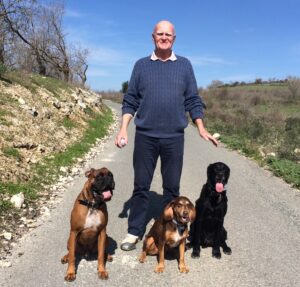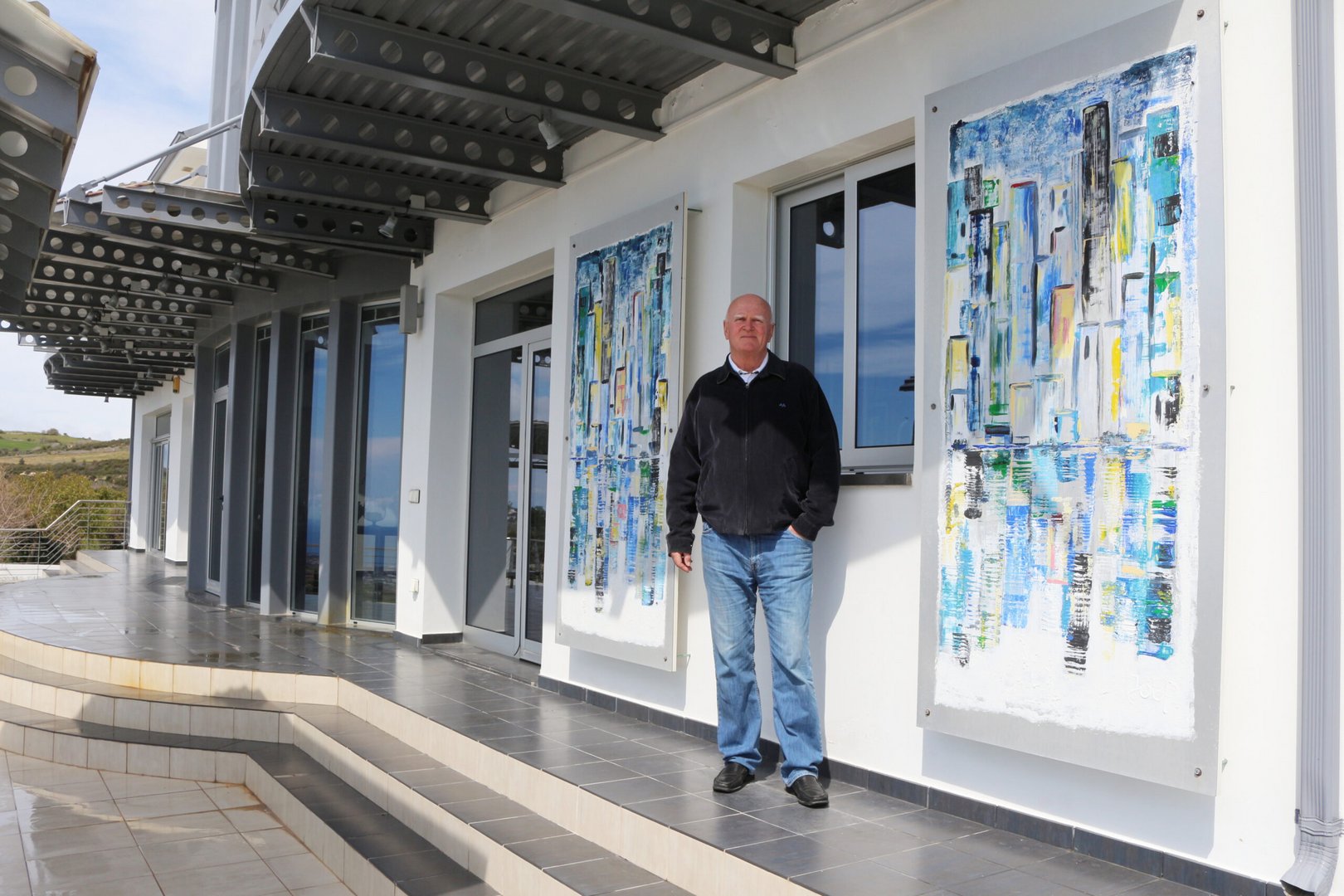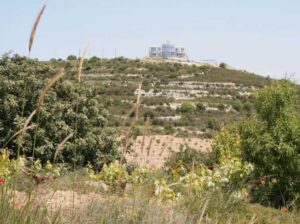In a risk taker with a swashbuckling CV, THEO PANAYIDES meets a man whose years in the City through the hedonism of the 60s and strife of the 70s see him now living to enjoy life from his Cyprus bolthole
Zoom is all very well, when it comes to interviews – but I’d like to have gone down to Paphos (actually the village of Armou) and seen Mirage Armou in the flesh, so to speak, Mirage being the big house on a hill, with a panoramic view stretching down to the sea, that Charles Smedley built for himself after coming to Cyprus in the early 00s. The idea was “a little bit crackers,” he admits – but he wanted something bold and substantial after decades in the City, and besides he’s always been a risk taker. Plus he needed a sizeable place to house his contemporary art collection.
Our Zoom line stutters and occasionally cuts out; the light is dim in what I assume is his study, the blinds behind him closed (he opens them once, flooding the room with light, to show me that glorious view). The light half-reveals a bald, ruddy gentleman with snow-white eyebrows and an easy, humorous manner, borne of a lifetime of informal presentations and business lunches. “It helps to be able to talk,” he says of working with clients in the financial sector, “string some words together, make a joke. Also, you’ve got to be a little bit self-deprecating… You don’t want to be a smart-arse all the time.”
 He turned 70 last April, which he admits was a shock – even more so because he’d intended to have a party, and was prevented by lockdown (“I do like a party”) – but he is indeed 70, born into a particular world and shaped by a certain era. His background was affluent and staunchly middle-class, though in fact that’s selling him short: “I’m from a bit of a controversial family,” he chuckles. “You can look up on Wikipedia – my father was Oliver Smedley, and if you Google him you’ll come across quite a story, which makes me look very modest”. His dad was a WWII hero then later a fiery free-trader, co-founding the Institute of Economic Affairs (recently described by Andrew Marr as “undoubtedly the most influential think tank in modern British history”); later, in the 1960s – when his son was a teenager – Oliver got involved in pirate radio, killed a business rival with a shotgun, and stood trial for manslaughter. “The jury found Smedley not guilty in under a minute on the grounds of self-defence,” says Wikipedia, “and awarded him 250 guineas in costs”.
He turned 70 last April, which he admits was a shock – even more so because he’d intended to have a party, and was prevented by lockdown (“I do like a party”) – but he is indeed 70, born into a particular world and shaped by a certain era. His background was affluent and staunchly middle-class, though in fact that’s selling him short: “I’m from a bit of a controversial family,” he chuckles. “You can look up on Wikipedia – my father was Oliver Smedley, and if you Google him you’ll come across quite a story, which makes me look very modest”. His dad was a WWII hero then later a fiery free-trader, co-founding the Institute of Economic Affairs (recently described by Andrew Marr as “undoubtedly the most influential think tank in modern British history”); later, in the 1960s – when his son was a teenager – Oliver got involved in pirate radio, killed a business rival with a shotgun, and stood trial for manslaughter. “The jury found Smedley not guilty in under a minute on the grounds of self-defence,” says Wikipedia, “and awarded him 250 guineas in costs”.
Young Charles, meanwhile, was a bit of a wastrel-in-waiting, not good in school (“I didn’t like being told what to do”) and a dropout at uni; “Let’s be honest, it was 1969,” he says with meaning. He was in Grenoble, in France, surrounded by American kids dodging the draft in Vietnam – “and we partied”. Fortunately, unlike today’s Gen Z-ers slogging through a five-stage interview process in pursuit of a few scarce jobs, that was a time when options were available to a youngster with no qualifications but lots of energy. (I assume his public-school education helped too.) Back in London, aged 19, Charles decided to apply for a job in finance. He sent six letters and received one possible offer, went for an interview and was accepted. “The interviewer said ‘I see you play rugby, where do you play?’. I said ‘In the three-quarter line’ and he said ‘OK, that’s good!’. So I think that helped,” he laughs, leaving me to wonder if it’s his famous self-deprecation or whether it was just a different time.
Once in the City, in any case, he quickly got his act together, not only passing the exam for the Institute of Bankers but coming 42nd out of 5,000 candidates. Again, he was shaped by his times – first the hedonism and individualism of the late 60s, then the nightmare of Britain in the mid-70s. At one point I ask how he views our current future, as a former consultant – what advice would he give to a hypothetical client? – and he twinkles with mirth: “May I joke? I’d say ‘Panic!’,” he replies, laughing merrily. “No – first of all, never panic. But secondly, it does not look good. We have, without question, an inherent inflationary push that’s coming through. Interest rates have been artificially low for maybe 10 years now. That can’t last, if you’re looking longer-term”. We appear to be heading into rough waters, once you add supply chains and so on – yet it’s also “not dissimilar” to what he saw in London 50 years ago, food and petrol shortages and rubbish piling up in the streets. In fact, he recalls, around 1975 he seriously considered leaving Britain and emigrating to Canada – but “then I decided I was going to stay, and get involved in politics”.
That’s another string to his bow – though in fact Charles’ political career only went so far. He joined the Young Conservatives, rising to become vice-chairman of the Greater London branch, spent some years as a local councillor in the Borough of Kensington and Chelsea, then ran unsuccessfully for Parliament (in a safe Labour seat) in 1983. The most intriguing aspect, however, is that he was also “somewhat controversial” in the party because he proposed the legalisation of cannabis, decades before that became mainstream – and his politics were (and are) closer to his dad’s than the Tories’ then or now, being in a word libertarian.
“I believe in the individual taking responsibility for their own life,” argues Charles on the wobbly Zoom line from Paphos, “and having the least amount of government interference possible. So I’m not saying there shouldn’t be any government – but I’m saying there should be a lot less government than there is, and individuals should be trusted to get on with their lives as much as possible.” Hence, for instance, cannabis, or alcohol or any other vice: “I believe you as an individual have the right to take stuff, if you wish to… If you drink a whole bottle of scotch and fall over dead, that’s your fault. The government isn’t there to stop you doing that – however it’s there to tell you it’s a bit silly, don’t do it, and to put a label on the bottle and so on. Education is one thing, laws that stop you doing things are something else.”
He’s pro-Brexit, of course. He’s also a great admirer of Margaret Thatcher, indeed the main reason why he didn’t try again for Parliament in 1987 was that, by that time, many of his cherished beliefs were already government policy. He’s also had a rough – as in depressing – time this past couple of years, with the exercise in government control that was (and is) Covid; vaccine passports strike him as absurd, and he’s “even, sort of, lost a few friends” for arguing about it too strenuously.
“I’m glad that I lived through an era when it got freer every year,” muses Charles nostalgically. “We started in the UK with homosexuality being illegal and then it was legalised, with women’s rights and so on – and during that period we became freer and freer. I fear that has come to an end. And I think that people are perhaps more willing to accept limitations on their freedom.”
In the end, it all flows together: the lifelong libertarian, the reluctant schoolboy who didn’t like being told what to do, a very international career, a certain restlessness and fidgety streak in his personality. He’s “better at the big picture than the little detail,” he admits good-naturedly. Art is his passion, and he’s always checking out exhibitions when abroad – his own collection is sizeable, around 60 pieces including a selection of Cyprus-based artists – but he doesn’t have the patience for parlaying that eye into actual creative labour. His friend Sharen Taylor runs a mosaic studio in Paphos, and she’s always asking him to come and try it out – but “I don’t do that. It’s just not me!” he exclaims with a kind of helpless shrug. “I can’t sit at a desk fiddling about with little bits of glass.”
 He didn’t come here to retire, indeed he was only in his 50s – but “regrettably, my [first] wife and I fell out,” as he puts it, so there he was, “a single man again” and able to live where he pleased. “I’d always loved the sunshine, I love swimming, and I loved the Mediterranean type of life. Coffee on the verandah in the sunshine, a salad with some grilled fish at lunch and a glass of wine, that kind of feel”. Cyprus was easy for an English speaker – and also convenient for his clients, who by that time were mostly in Asia and Africa. Charles had made his career consulting on investments in the minerals market with HSBC (he also set up James Capel Securities, the firm’s New York office), then left the bank and took to advising smaller companies on how to raise money in the City – then decided to start finding projects himself, the most ambitious being perhaps a semi-successful plan to mine sapphires in Madagascar in 2006.
He didn’t come here to retire, indeed he was only in his 50s – but “regrettably, my [first] wife and I fell out,” as he puts it, so there he was, “a single man again” and able to live where he pleased. “I’d always loved the sunshine, I love swimming, and I loved the Mediterranean type of life. Coffee on the verandah in the sunshine, a salad with some grilled fish at lunch and a glass of wine, that kind of feel”. Cyprus was easy for an English speaker – and also convenient for his clients, who by that time were mostly in Asia and Africa. Charles had made his career consulting on investments in the minerals market with HSBC (he also set up James Capel Securities, the firm’s New York office), then left the bank and took to advising smaller companies on how to raise money in the City – then decided to start finding projects himself, the most ambitious being perhaps a semi-successful plan to mine sapphires in Madagascar in 2006.
Saying that he worked in the financial sector is a bit misleading: there’s a big difference between being an auditor and this kind of swashbuckling CV. He’s done corporate work, to be sure, like being tasked with setting up a pan-European securities business (even that required him to jet around Europe for three years) – but he’s also been stung by ants in the jungle in Ivory Coast, and accosted by disgruntled investors (“I misinterpreted the data”) when a copper and gold venture in Hungary went belly-up. He’s tried projects that didn’t pan out, like a predictive-algorithm research company called RE4D, and projects that did. “I’m sure I have been foolish in taking risks. But life is for living, and I’m willing to go and get stuck in.”

‘Life is for living’, indeed – and Charles Smedley does come across as a bon viveur, a robust kind of person, arguing politics over (I assume) fine wine and hosting dinner parties with his wife Katy in the spectacular expanse of Mirage Armou (“Some of my friends call it Terminal Five,” he reports gleefully). He met Katy 14 years ago, both newly separated from their previous spouses; she wasn’t really looking to get involved, “so we were just very good friends, till suddenly on one of her birthdays I – uh, approached her for a kiss, and she responded”. She has two daughters, he has two sons from his first marriage; the daughters have grown up and left so Mirage is actually for sale now, the couple planning to move into Armou village. Katy is “the happiest relationship I’ve ever been in,” he confesses, adding: “Regrettably, previous ones have proved more complex and difficult”. I suspect he’s not entirely easy to live with, despite his openness and outgoing nature. That need for freedom isn’t always negotiable.
No regrets, in any case. It’s a kind of philosophical imperative for a libertarian – if one insists on the individual’s right to make their own decisions, it follows that those decisions must be respected even when they turn out to be wrong – but it’s also that Charles is retired now, and having regrets makes no sense when you’re retired. He takes his dogs for a walk, keeps an eye on politics and the local art scene, swims in the summer; he does get “a little bit of an urge to get stuck in to some project – but I know how tiring those projects are, and I’m not sure I have the energy to take them on anymore”. (Instead he advises his son Tom, an LA-based entrepreneur, on his own projects.) There’s nothing he really wants to do, “I don’t want to jump out of helicopters or go bungee-jumping… I’m going to indulge in just enjoying life – but I haven’t got any real ambitions, no.”
There’s a slight autumnal quality to our conversation. Maybe it’s just Zoom cutting out, and the dim light in the study – but it’s also that he’s done so much, and so vigorously. It’s a little sad when a bold belief in taking charge of one’s own life pushes up against the matter-of-fact reality of growing older. “I know I was very lucky to live through the era that I did – and in the position that I was in,” he muses. “I mean, I was at the fun end of the game, OK? The financial world – we could make good money, and travel and all of that. I’m not sure that it’s as easy to do that now, as it was for me”. Charles stands for something, an age of prosperity and confidence – and of course the age before Zoom, when I’d have had to trek out to Paphos and actually meet him. Maybe next time.


